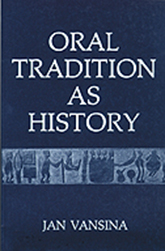|
Oral Tradition as History
Jan Vansina
“Oral Tradition as History is one of the best books of this genre. This volume’s achievements reach well beyond any single discipline and create a bridge between the humanists and social scientists. If there is a single book that Africanists, oral historians, anthropologists, and folklorists should add to their personal libraries, this is it.”
—Oral History Review
Jan Vansina’s 1961 book, Oral Tradition, was hailed internationally as a pioneering work in the field of ethno-history. Originally published in French, it was translated into English, Spanish, Italian, Arabic, and Hungarian. Reviewers were unanimous in their praise of Vansina’s success in subjecting oral traditions to intense functional analysis.
Now, Vansina—with the benefit of two decades of additional thought and research—has revised his original work substantially, completely rewriting some sections and adding much new material. The result is an essentially new work, indispensable to all students and scholars of history, anthropology, folklore, and ethno-history who are concerned with the transmission and potential uses of oral material.
Jan Vansina is the John D. and Catherine T. MacArthur Professor and the Vilas Professor in History and Anthropology at the University of Wisconsin–Madison. He was elected to the American Academy of Arts and Sciences in 1983 and was the first scholar chosen as “Distinguished Africanist” by the African Studies Association of the United States. His many books include Paths in the Rainforest,
Living with Africa, Kingdoms of the Savanna (winner of the 1967 Herskovits Prize), and The Children of Woot, all published by the University of Wisconsin Press.
Praise
“Since its first appearance nearly a quarter of a century ago, no book has more essentially shaped the evolution of African historical methodology than Jan Vansina’s Oral Tradition. . . . Vansina has now written an updated version of his seminal contribution . . . those embarking on the challenging adventure of historical fieldwork with an oral community will find the book a valuable companion, filled with good practical advice. Those who already have collected bodies of oral material, or who strive to interpret and analyze that collected by others, will be forced to subject their own methodological approaches to a critical reexamination in the light of Vansina’s thoughtful and provocative insights. . . . For the second time in a quarter of a century, we are profoundly in the debt of Jan Vansina.”
—Research in African Literatures
“Oral Traditions as History is an essential addition to the basic literature of African history.”
—American Historical Review
|

September 1985
LC: 84-40504 D
272 pp. 5 ½ x 8 ½
1 illus.
|

